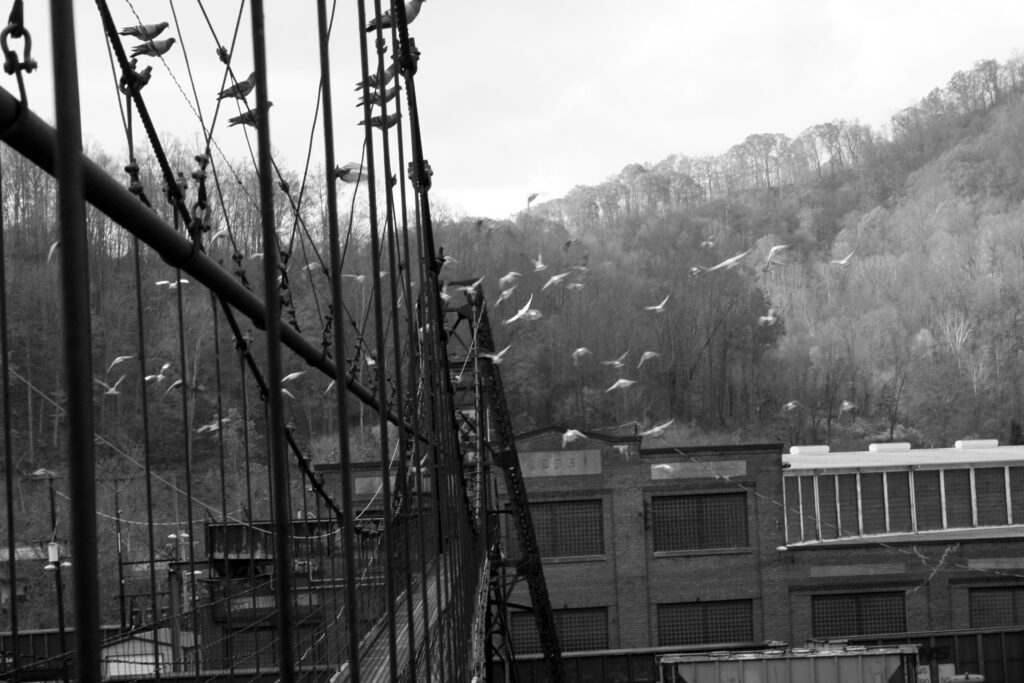Since leaving the mining industry six years ago, I’ve gone in search of justice for Appalachia. It has been a hard journey coping with the deepening realities of our situation and the staggering amount of damage that’s been inflicted upon our communities—culturally, economically, and environmentally. I’m not going to lie. There have been many times I’ve wanted to give up and just find a quiet little farm off to ourselves, but I can’t. Perhaps it’s sheer insanity, but I can’t stop fighting.
I realized early on that when the union left, much of the fight for justice in Appalachia left with it. The only people who seemed to care and continue the fight were the environmental organizations that came to stop mountain top removal. It was only natural that I would join in to see what I could do to help. While many were discounted as being out-of-touch and caring only about trees and salamanders, I knew their cause was much further reaching than environmental justice. They were also working to end the social and economic injustices being inflicted on us by the coal and natural gas industries.
I learned a great deal from my time spent working with organizations like Appalachian Voices and the Southern Appalachian Mountain Stewards . Because of their help and guidance, I was given the desire to create this blog and take a chance on a new life in Berea, Kentucky. I even applied to Berea College where I was accepted to attend one of the few tuition-free work colleges in the nation.
During my four years at Berea, I focused my studies on a problem I had noticed during my time working with some of the other environmental groups. Despite their passion and love for the Appalachian people, many of them were failing to communicate with coal mining communities. Cultural barriers quickly became immense walls, and the failure to address the issue pushed many local people to align themselves with the coal industry and coal-friendly politicians.
It was a problem I found in other struggles across the nation as well. During our summer breaks, we traveled as a family, speaking about Appalachia’s issues while learning about problems elsewhere. Our travels took us to Peabody’s Kayenta Mine on the Navajo Reservation, the natural gas fields of southwestern Pennsylvania, coal mining in the Powder River Basin of eastern Montana, and even the Pacific Northwest where issues were arising from trains carrying coal and Bakken crude to seaport terminals for international export. In every place, good people were suffering. They were being taken advantage of. They were dealing with the same problems we have in Appalachia: exploitation, poverty, sickness, and an utter disrespect for human dignity by outside corporations pursuing quarterly profits.
Realizing these issues, realizing the massive problem of the blue-green divide, i.e. the division between the working class and various non-profit “justice” groups, I found my purpose. I knew that my life had to be lived working to bring the two together—to end the conflicts that keep us divided and keep the corporations in control. It’s hard though. It’s hard to be caught in the middle. I’ve lost many friends on both sides from my stubborn resolve, and at times, my brutal honesty. We are all losing. Every moment of every day corporations are taking our health, our happiness, and our children’s future along with it. I hope people will overlook my faults, understand our similar passions for justice, and work towards the needs of our communities.
And so, my decision to major in communications with dual minors in Appalachian studies and sustainability and environmental studies, came with a purpose. Following my graduation this past May, I began a leap of faith that I am still currently on—Breaking Clean, LLC and my work with the documentary film Blood on the Mountain.

Breaking Clean was named after our cross-country speaking tours as a family, sponsored by Appalachian Voices and Eagles Nest Outfitters (ENO). While yes, it is an LLC, it is a non-profit at heart. It is a public relations and media outreach firm through which I am offering up services in communications consultation, writing, journalism, film-making, and public speaking. It is my way of trying to continue the fight for justice while also providing for my family.
My first major project has been assisting with the release and public outreach for Blood on the Mountain, a documentary film about the history of coal’s exploitation and corruption of West Virginia, specifically Southern West Virginia.
Thus far, the film has been released for week-long runs at theatres in New York, Los Angeles, and Washington, D.C. It has been screened at multiple film festivals, academic conferences, all while garnering some amazing reviews. But it’s not about that. It’s about the film’s ability to bring justice that has me so vested in it.
For coal mining communities, it’s a reminder of who the real enemy is in the region. For people outside of coal mining communities, it’s a lesson and a warning, about how much control corporations can wield over a people and a land—even in America, even today.
It provides a new lens through which Appalachia must be viewed and how Appalachians must view themselves. By exposing the countless acts of political corruption perpetrated by the coal industry in West Virginia, and by detailing the way the coal industry has manipulated local culture, the Blood on the Mountain artistically expresses the broken, fragmented psyche that exists within my mountain home. It brings us up to date with the current situation many communities are facing, including my father and grandfather’s own pending loss of union retiree benefits that includes their pension and healthcare. It re-opens a door to our history closed by the coal industry, one we must walk through if we are ever to find our way to a better future.
The filmmakers are personal friends who have put everything on the line for this film, dedicating several years to it and stretching themselves beyond thin financially. We are all just a few steps from the poor house, but it’s important to us that we put this film, and it’s message, out in front. We all want this film to bring justice.
Aside from the film, I’m still working to build Breaking Clean, to help shed light on all the injustices we face in the world, to help people find common ground, and to get people thinking about ways they can live happier, healthier lives through reducing their spending, debt, and all the externalized costs that go along with it.
I will continue to write, create media, and help out organizations who would like to reach a broader audience. I can’t do it alone though. I’d appreciate any help you can give, be it work, networking connections, even monetary donations (as much as it hurts my pride to ask).
In hope and struggle,
Nick Mullins
“The Thoughtful Coal Miner”

